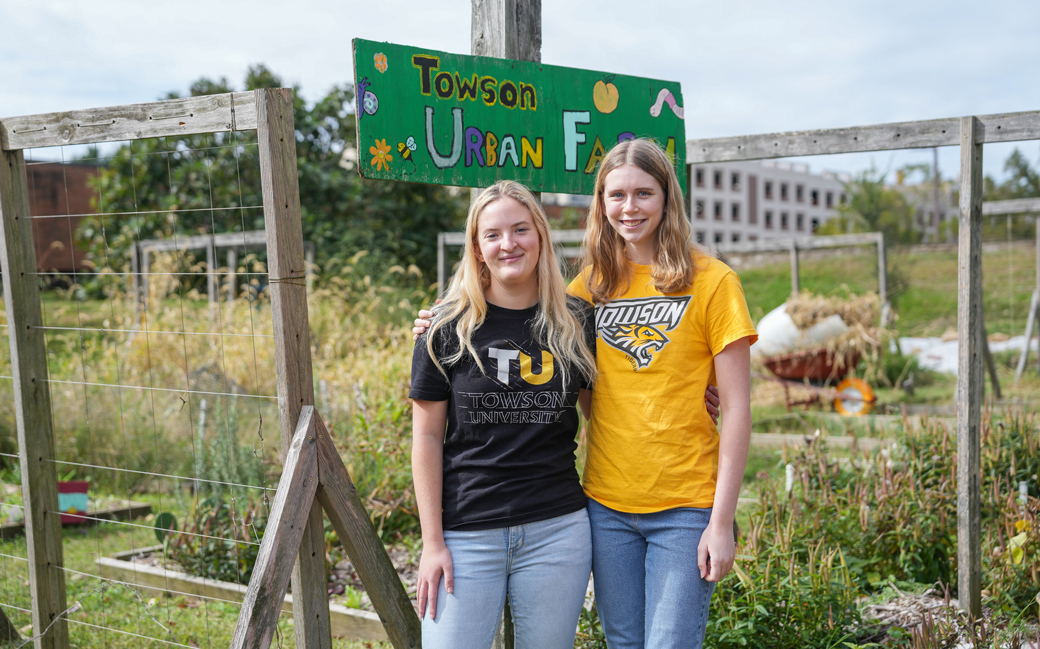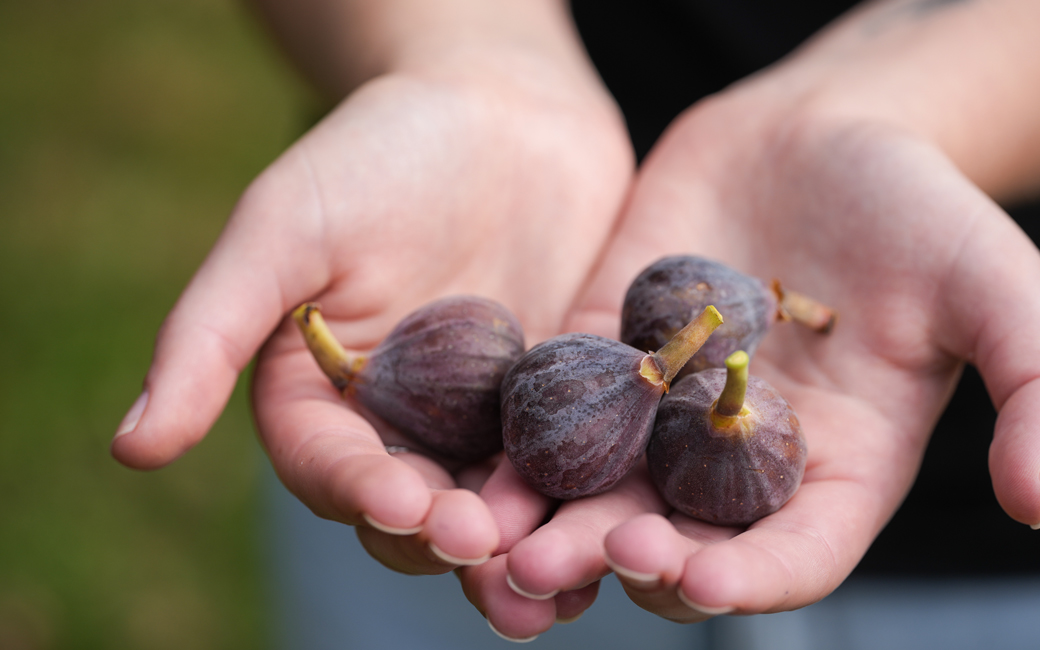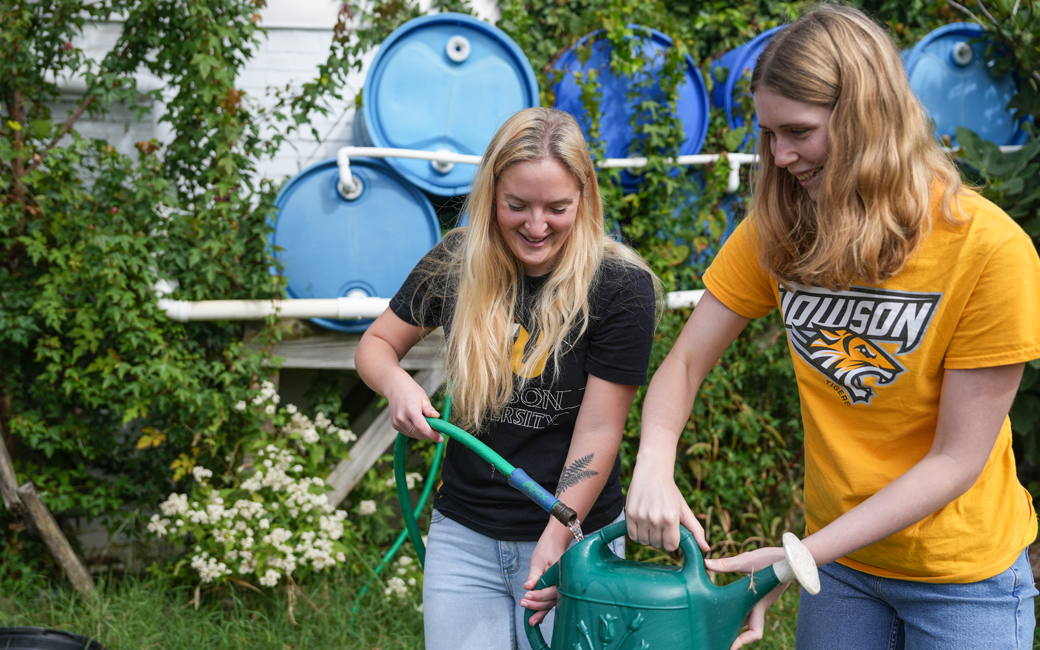Food Recovery Network, Urban Farm partner to support sustainability on campus
Student leaders Hailey Mark and Melanie Young share the impact of sustainable practices for the Towson community
By GRACE HOGGARTH '22 on October 23, 2023

For roommates Melanie Young and Hailey Mark, sustainability is at the core of their campus involvement. As leaders for Towson University’s Food Recovery Network and Urban Farm, respectively, they share a passion for reducing food waste on campus and providing access to fresh food for the greater TU community.
The pair consistently work together, with support from the Office of Sustainability, to reduce food waste on campus and raise awareness about food insecurity, waste and the benefits of urban farming.
The Food Recovery Network is the nation’s largest student-led, nonprofit organization fighting food waste and hunger. TU’s chapter prioritizes the reduction of food waste from campus dining halls and satellite cafes by collecting leftover food, measuring it and distributing it to local partners, St. Vincent de Paul Baltimore ‘Sarah’s Hope Family Shelter’ and Adopt-A-Block’s ‘A Can Can Make a Difference.’ Food waste encompasses any and all foods that are fit for consumption but consciously go to waste at the retail level, usually at the end of a business day.
As the president of the Food Recovery Network, Young organizes and facilitates weekly meetings as well as recruits the volunteers who collect food from the dining halls and satellite cafes and coordinates the drivers who deliver to local food pantries. A junior majoring in speech-language pathology and audiology, Young heard about the Food Recovery Network through Mark.
This semester alone, the Food Recovery Network has collected between 300 and 500 pounds of food waste every week; a significant impact on campus so far, according to Young.
“Food waste is such a big issue. Forty percent of the food in the U.S. goes to waste. When you think about how many people are hungry and food insecure, it is startling. After COVID-19, the Food Recovery Network improved its impact beyond Au Bon Pain to all campus locations [including dining halls, satellite cafes and the on-campus Starbucks],” Young says.
“It’s been great to see Mel flourish as a president. We have different but important roles, and we work well in tandem—she leads people, and I do the behind the scenes and support her where she needs help. Sometimes with a lot of volunteers, it can be very overwhelming,” says Mark.

The Urban Farm, helmed by Mark, grows fresh fruits, vegetables and herbs available to students and the local community. The farm enables students, faculty and campus organizations to learn more about the composting process, reducing waste and the value of farm-to-table. The herbs grown at the farm are given to the campus Food Share, where students and faculty experiencing food insecurity can obtain the necessary items.
According to Mark, the primary goal of the Urban Farm is “trying to teach the people in Baltimore and in the Towson community how to learn where their produce comes from.”
Senior environmental science major Mark hosts “Homegrown with Hailey,” an interactive experience for students to get involved and learn about farming at the Urban Farm. Students get a tour of the farm, learn about composting, observe what is growing and learn how to maintain the farm. “It’s a space for people who have never farmed before to get a real hands-on experience,” says Mark. Students can even earn service hours for their student organizations.
“ Sustainability seems like a big challenge for a lot of people. But it’s doable if you’re able to break the first barrier of being nervous. Sustainability can be achievable. ”
Mark is also the sustainability coordinator in the Office of Sustainability, where she works closely with the Director of Sustainability Patricia Watson and Young to educate and raise awareness of sustainability efforts on campus like Know Before You Throw, Stop and Sort, the spotted lantern fly and the new interactive waste sorting system, Oscar.
“It’s been great to see Hailey completely transform the Urban Farm and create a community. We’ve made a lot of friends through sustainability, it’s not just about the impact we're making. It’s how it's also helped us build community, make friends and find people with similar missions. A lot of people want to be more sustainable, and it’s been cool to meet like-minded people and give them opportunities to be sustainable, too,” Young says.
Furthermore, conversations surrounding sustainability aren’t limited to their weekly meetings. As roommates, Young and Mark often find their passion for addressing food insecurity and waste flows into casual conversations at home.

Young and Mark want students, faculty, staff and other campus partners to know that practicing sustainable habits regularly can make an impact, especially when you work as a team. Speaking on volunteer involvement in the Food Recovery Network, Young says, “When you think about your role, it’s not like you’re taking hours out of your day. You get to volunteer 45 minutes of your time and make this impact, which is really cool. That’s the power of community and teamwork.”
Ways to Practice Sustainability on Campus:
- Stay up to date with the Office of Sustainability's tips.
- Separate your food waste and packaging by practicing Stop and Sort.
- Utilize the Oscar devices in the University Union to properly separate your food waste.
- Turn off your lights when you are not using them.
GET INVOLVED
You, too, can make an impact. Attend a meeting to learn how you can practice sustainability in your daily life.
- Urban Farm (Homegrown with Hailey) Meetings
- Every Thursday from 4 to 5 p.m. (Urban Farm, next to the Administration Building)
- Food Recovery Network Meetings
- Every Friday at 3 p.m. (Outside of Au Bon Pain, Hawkins Hall)